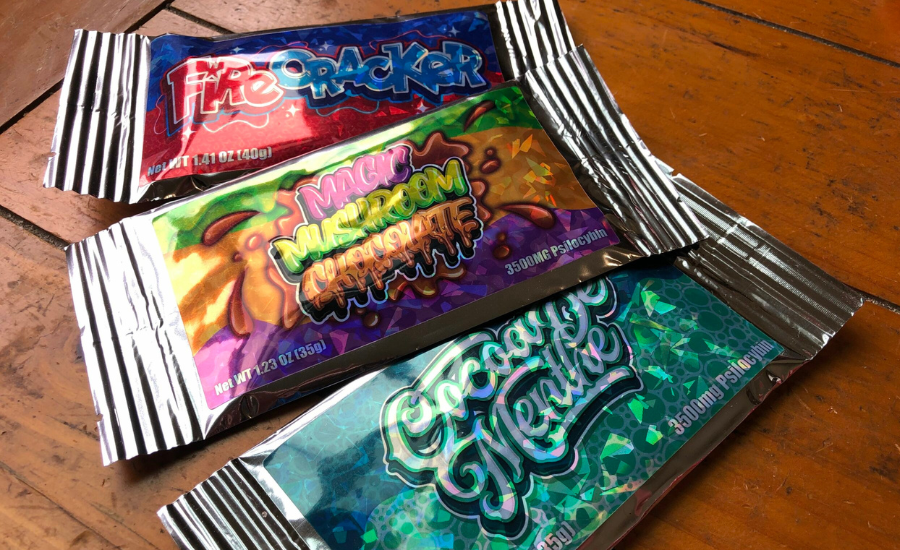Mushroom chocolate bars have recently become a cause for concern for law enforcement agencies, as their popularity and availability have increased. These bars contain psilocybin, a naturally occurring compound found in certain types of mushrooms. That can cause hallucinations and other psychedelic effects when ingested.
The rise in popularity of mushroom chocolate bars can be attributed to a growing interest in natural remedies and alternative therapies. Some people use psilocybin for recreational purposes, while others use it to treat conditions such as anxiety, depression, and PTSD.
Illegal to possess or distribute
However, despite its potential therapeutic benefits, psilocybin is still considered a Schedule I controlled substance under US federal law, meaning it is illegal to possess or distribute. In addition, the potency of psilocybin can vary widely depending on the species of mushroom used, making it difficult to control the effects and potential risks of consuming mushroom chocolate bars.
Law enforcement agencies are particularly concerned about the availability of these bars online, where they can be easily purchased and shipped across state and international borders. Many websites offer mushroom chocolate bars as “novelty items” or “not for human consumption,” but it is clear that they are intended for recreational use.
The distribution of mushroom chocolate bars is not limited to the internet. Some vendors sell them at music festivals, raves, and other events, often targeting young people who may be more likely to experiment with drugs. Additionally, as people seek to imitate the results of products made by experts, homemade mushroom chocolate bar recipes are also growing in popularity.
Risks of consuming mushroom chocolate bars
The potential risks of consuming mushroom chocolate bars are significant. In addition to the risk of arrest and prosecution for possessing or distributing a controlled substance. There is also a risk of physical and psychological harm. The effects of psilocybin can be unpredictable and can vary widely from person to person. In some cases, it can cause anxiety, paranoia, and even psychosis. There is also a risk of accidental overdose, particularly if the potency of the psilocybin is unknown.
The use of psilocybin as a therapeutic tool is still being studied, and there is much that is still unknown about its potential benefits and risks. While some studies have shown promising results for treating conditions such as depression and anxiety, more. Rresearch is needed to fully understand the long-term effects of psilocybin use.
In the meantime, law enforcement agencies are taking steps to address the growing popularity of mushroom chocolate bars. Some agencies are focusing on intercepting shipments of these bars, while others are targeting vendors who sell them at events or online. However, the ease of purchasing and distributing these products means that it will be difficult to completely eradicate their availability.
The rise of mushroom chocolate bars highlights the ongoing debate over drug policy in the US. While some argue that psilocybin should be decriminalized or even legalized for therapeutic use. Others argue that it should remain a controlled substance due to its potential risks and the difficulty of regulating its use.
Concerns
The emergence of mushroom chocolate bars has sparked debates among policymakers and researchers regarding the legality and regulation of psilocybin. While some have called for the decriminalization of the compound, others have warned of the potential risks of unregulated use.
One of the major concerns about mushroom chocolate bars is the lack of oversight and quality control in their production. Unlike pharmaceutical drugs, these bars are not subject to rigorous testing and regulation by the FDA. As a result, there is no way to ensure that the potency and purity of the psilocybin are consistent and safe for consumption.
Moreover, the use of mushroom chocolate bars may exacerbate underlying mental health conditions such as anxiety, depression, or bipolar disorder. Individuals with a history of psychiatric disorders may be particularly vulnerable to the adverse effects of psilocybin. Such as delusions, paranoia, or panic attacks. Therefore, it is crucial that consumers are aware of the potential risks and consult a healthcare professional before using psilocybin.
Another issue is the potential for addiction to or abuse of psilocybin. While psilocybin is not known to be physically addictive. Some individuals may develop a psychological dependence on the compound, similar to other hallucinogens such as LSD or mescaline. Moreover, some may use psilocybin as a form of self-medication, which may lead to self-harm or worsening of their symptoms.
The lack of research on psilocybin is another challenge for policymakers and regulators
While some studies have suggested that psilocybin may have therapeutic effects on various mental health conditions. Such as depression, anxiety, or addiction, more research is needed to confirm these findings and to identify the optimal dosages. Administration routes, and safety protocols for using psilocybin in clinical settings.
Furthermore, the legal status of psilocybin varies across jurisdictions, which may create confusion and inconsistencies in its regulation. For instance, while some states have decriminalized psilocybin possession or use, others have maintained its criminalization. In addition, the federal government still classifies psilocybin as a Schedule I substance, which makes it illegal to produce, distribute, or use under federal law.
The rise of mushroom chocolate bars highlights the challenges of regulating emerging drugs in a rapidly evolving market. Policymakers and law enforcement Agencies need to balance public health concerns with civil liberties, scientific evidence with public opinion. and national regulations with international treaties. Moreover, they need to adopt evidence-based strategies that prioritize harm reduction, education, and access to healthcare. Rather than punitive measures that perpetuate stigma and criminalization.
To sum up, mushroom chocolate bars represent a new challenge for law enforcement agencies, public health officials, and policymakers. As they raise concerns about the legality, safety, and regulation of psilocybin. While some may see psilocybin as a promising tool for treating mental health conditions. others may view it as a dangerous drug that should be prohibited. Therefore, it is essential to have an informed and evidence-based debate about the risks and benefits of psilocybin. And to adopt comprehensive and compassionate policies that protect public health and human rights.
Conclusion
In conclusion, mushroom chocolate bars are a cause for concern for law enforcement agencies due to their illegal status. And potential risks to consumers. While some argue that psilocybin has therapeutic potential, more research is needed to fully understand its effects. In the meantime, it is important to educate the public about the risks of consuming mushroom chocolate bars. and to take steps to prevent their distribution and use.
For more informative articles like this visit: www.bellevueheadlines.com

